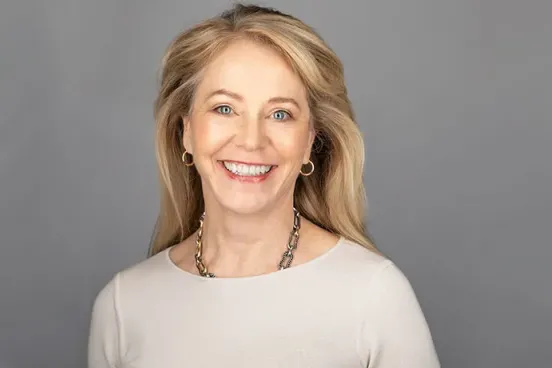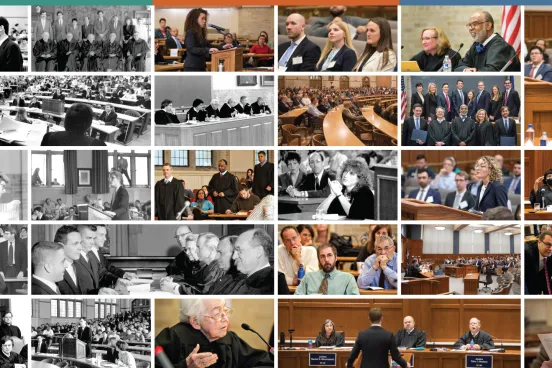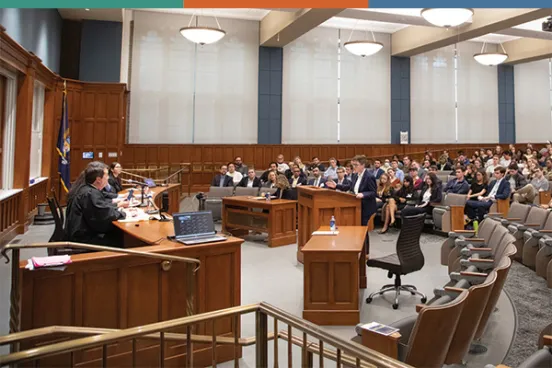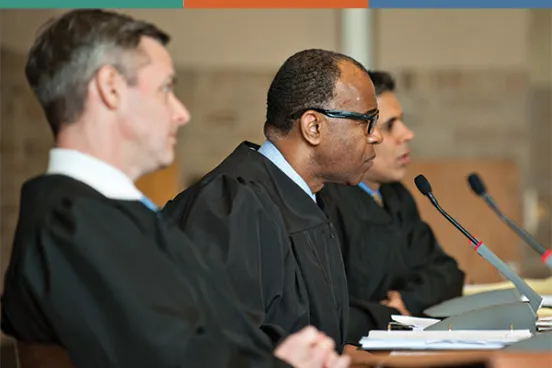It was something of a full-circle moment for Linda Coberly, ’95, when she set out to coordinate amici filings in the landmark NCAA v. Alston case, in which student-athletes successfully sued the NCAA by arguing that the organization’s compensation practices violated antitrust laws.
Not only did her first call go out to a friend and former classmate she had known since Michigan Law orientation—Michael Carrier, ’95, who quickly enlisted the support of Christopher Sagers, ’97—she was once again preparing materials for Supreme Court argument, a process she’s been familiar with since she clerked for Associate Justice Stephen Breyer after law school.
NCAA v. Alston concerned NCAA rules that prevented schools from offering enhanced packages of education-related benefits to attract students. Winston & Strawn, where Coberly chairs the appellate and critical motions practice, has one of the top sports practices in the nation and represented the student-athletes from an early stage.
As counsel of record on the case, Coberly was involved in briefing the Ninth Circuit, opposing certiorari at the Supreme Court, and then in preparing the case and briefing the case for arguments.
When it came time to coordinate amici filings, Coberly turned to her classmate Carrier, a professor at Rutgers Law School and a prominent antitrust scholar, to provide a brief on behalf of academics who specialize in antitrust issues. Carrier reached out to Sagers, another leading antitrust scholar and professor at Cleveland-Marshall College of Law, and they spearheaded an amici filing on behalf of 65 professors of law, business, economics, and sports management.
Coberly, Carrier, and Sagers weren’t the only Wolverines involved in the case. Coberly’s colleagues at Winston & Strawn included graduates of the Law School and U-M undergraduate programs, including partners Derek Sarafa, ’97, who participated at the trial court level before his death in 2015, and Jeanifer Parsigian, AB ’06. Coberly also coordinated the case with lawyers from Hagens Berman, including Steve Berman, BS ’76.
The brief that Carrier and Sagers spearheaded ultimately was cited in the opinion written by Justice Neil Gorsuch, when all nine justices ruled in favor of the student-athletes. After argument, Coberly felt good about receiving a favorable ruling, but it was particularly gratifying to receive a unanimous decision.
“The ruling is really important for the many athletes who sacrificed so much for their teams, including their health and their bodies,” Coberly says. “The majority of those students never go pro, and they are people for whom some additional internships, tutoring, and other benefits related to education will make a real difference in their lives—and in their ability to support themselves when they leave school.”
Coberly has been with Winston & Strawn since 2004, when she joined the firm as a lateral partner from the trial and appellate practice at Mayer Brown. Her intention at Winston & Strawn was to build an appellate practice that broadened the firm’s understanding of what the practice could be. The first step was persuading colleagues that it could be a growth opportunity for the firm, and that there was value in building a team of appellate specialists that would work more closely with partners in trial litigation.
“I have found that the same clients who are sophisticated about wanting a trial lawyer at the top of their cases are also sophisticated about wanting appellate lawyers involved,” she says. “It’s been a really great fit for me.”
At Winston & Strawn, she wanted to establish herself as someone who was not just a brief writer but a first-chair appellate advocate.
“There were a few of us creating this practice group, and I wanted a model that was not just appellate lawyers as brief writers but instead appellate lawyers as lead counsel for their clients on appeals and otherwise,” she says. “Appellate lawyers are very well suited to be trusted advisors because we have an opportunity to talk with our clients about their most important strategic legal issues, and we can help them coordinate their positions across a large body of individual litigation matters. You don’t get to do that if you’re only writing briefs in your office.”
Coberly leads teams at the trial court level in motions-intensive litigation, particularly for securities cases—which are often litigated by motions—because of her familiarity with the legal issues that will drive the outcome. This is a somewhat unusual role, but for Coberly, it’s a symbiotic intersection of her appellate experience and her expertise in securities-related law.
She also frequently collaborates with trial lawyers on class actions, which are also motions intensive. And for cases that go to trial, she serves as appellate lawyer on the trial team, working with the trial lawyers to prepare the case for success on appeal. To Coberly, this varied approach helps keep the job interesting.
Until September 2021, Coberly served as managing partner of Winston & Strawn’s Chicago office, a position she held for six years. She remained chair of the firm’s appellate and critical motions practice throughout that time and led the firm’s largest office through the first 18 months of the pandemic.
Among other priorities, Coberly sought to further integrate the different functions of the firm during her tenure as managing partner, particularly as it relates to the lawyers and the non-legal staff.
“We couldn’t do what we do for our clients without our non-lawyer staff, and I wanted to make sure everyone felt like they were playing a role in the work,” she says. “I found that our staff loved hearing about the work during our team meetings, including pro bono work we’re doing in the community. It’s important to pull our people together across their functions and help everyone feel part of a single team.”
In some ways, the pandemic helped to encourage this kind of community building.
“The pandemic blasted through the separation between the personal and professional in a way that I don’t think any of us had experienced before,” she says. “This has been a very taxing period, and it’s really important to talk about that and acknowledge the impact, and for each of us to be kind to one another and respectful to one another as we work through this difficult time. I think having that level of connection and authenticity with one another has helped us to build culture across distance during the pandemic in a pretty effective way.”
Coberly says that one advantage of being at a large firm is the opportunity to work on a wide variety of projects, from securities litigation to Supreme Court cases to a breadth of pro bono projects, including work on immigration cases and advocacy in support of the Equal Rights Amendment, a particular passion of hers.
“It’s a diverse and interesting practice. Every day there’s something different, and that’s one of the reasons I love it,” she says. “It’s an endlessly fascinating job to have.”







